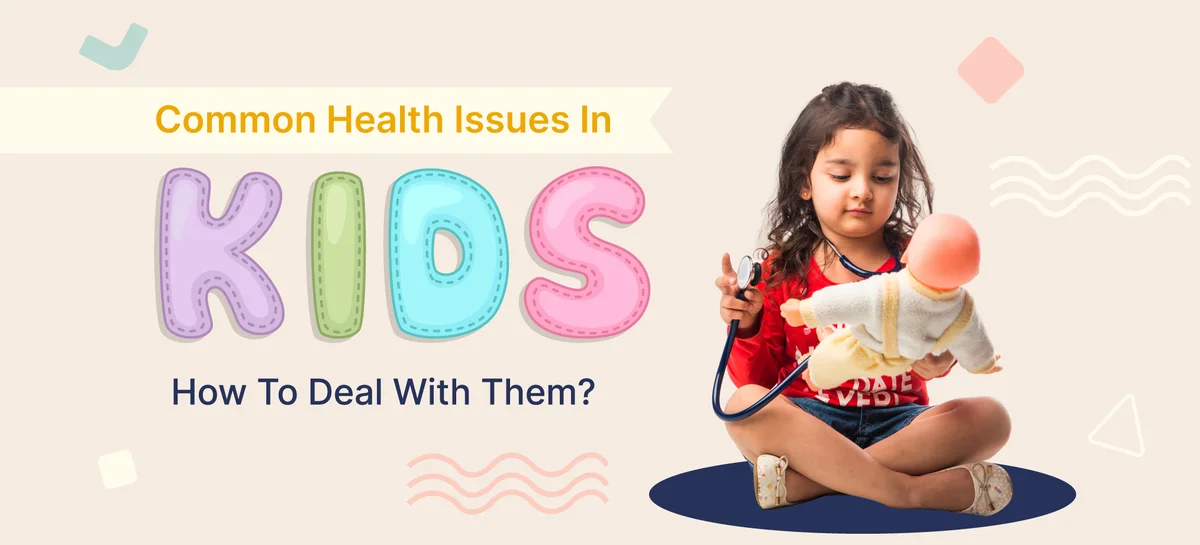- Home
- Blog
- Mom & Baby Care
Five Most Common Health Issues In Children & How To Deal With Them
Mom & Baby Care
Five Most Common Health Issues In Children & How To Deal With Them
By Apollo 24|7, Published on- 16 November 2022, Updated on -05 February 2025
Share this article
0
0 like

Though parents try to give their children the best, they often find themselves in the eye of a storm when their child falls sick. Children are more likely to fall prey to diseases resulting from environmental microbes as their immune systems are still developing. Knowing about the most common diseases in children allows parents to be alert enough to spot the signs in time and seek immediate medical care.
Let's look at the five most common diseases in this article!

5 Most Common Diseases In Children
1. Respiratory infections
With the change of seasons, children are the first to catch the flu. Sore throats, swollen tonsils, increased body temperature, and running noses are a few of the most common symptoms of respiratory infections in children.
Respiratory infections attack the respiratory tract in children and can be caused by viruses or bacteria. Usually, these infections resolve in five to ten days and may require prescription medicines.
2. Diarrhoea
Diarrhoea is a leading cause of death in children below five years of age. Commonly called 'stomach flu', diarrhoea is one of the most common diseases in children and is often accompanied by stomach pain. Digestive issues, including diarrhoea in children, can be prevented by eating healthy home-cooked foods that are fibre-rich and ensuring proper hand hygiene.
Recommended read: Managing Neonatal Jaundice through Ayurveda
3. Urinary tract infections
Children are likely to develop urinary tract infections (UTIs) from their schools, public toilets, or other places, including their homes. UTIs occur when the bacteria present in the anus enter the urinary tract. Common symptoms include burning or pain during urination, frequent or urgent need to urinate, bedwetting, and abdominal pain.
Based on the intensity of the infection and the age of the child, paediatricians may recommend antibiotic treatment. They are also advised to drink more water to hasten natural healing.
4. Ear infections
Ear infections in children can occur due to bacteria or viruses. Otitis media is the most common ear infection seen in children that can cause ear pain, irritation, along with mucoid discharge. Other causes of ear infections include swimmers' ear and sinus infections.
It is important to know that most ear infections are caused by viruses and cannot be treated with antibiotics. It is, therefore, important to diagnose the cause of the ear infection correctly before treating it.
5. Hand-foot-mouth disease
Hand-foot-mouth disease is a mild yet contagious viral infection seen in young children. This is one of the most common illnesses in infants and children younger than five years old. This infectious disease is caused by the coxsackievirus, and a few common symptoms include:
- Fever
- Sore throat
- Malaise (generalised feeling of sickness)
- Painful blisters on the gums, tongue, or inside the cheeks
- A rash on the palms, soles, and sometimes on the buttocks
- Loss of appetite
- Increased irritation or fussiness in toddlers
Though the hand-foot-mouth disease is a mild infection, a visit to the child's doctor is mandatory. There is no specific treatment for the condition, but most children are prescribed medications to alleviate their symptoms.
Most diseases in children are caused by infectious agents like viruses or bacteria. These diseases can be prevented by following healthy hand and personal hygiene practices, disinfection of common areas, and avoiding close contact with affected individuals.
If you need more information about common health conditions in children,
Also read: Neonatal Care: Baby's Treatment in the NICU
Consult An Apollo Paediatrician
Medically reviewed by Dr Sonia Bhatt.
Services
Mom & Baby Care
Leave Comment
Services
Recommended for you
.jpg?tr=q-85)
Mom & Baby Care
5 Skincare Products That Every Baby Kit Must Have
To protect and nourish a baby’s skin, the usage of high-quality, gentle products is important. We’ve carefully selected five essential skincare products that are a must-have in every baby's kit.

Mom & Baby Care
Indian Diet Chart for Breastfeeding/Lactating Mothers
A lactating mother's nutritional health directly affects both the amount and quality of her breast milk. In fact, a good diet is equally important for the mother to battle the dreaded postpartum fatigue.

Mom & Baby Care
Flu Symptoms: When To Bring Your Child Into The Emergency Centre?
Discover crucial guidelines for identifying when your child's flu symptoms warrant a trip to the emergency centre. Prioritise their health and safety.
Subscribe
Sign up for our free Health Library Daily Newsletter
Get doctor-approved health tips, news, and more.

